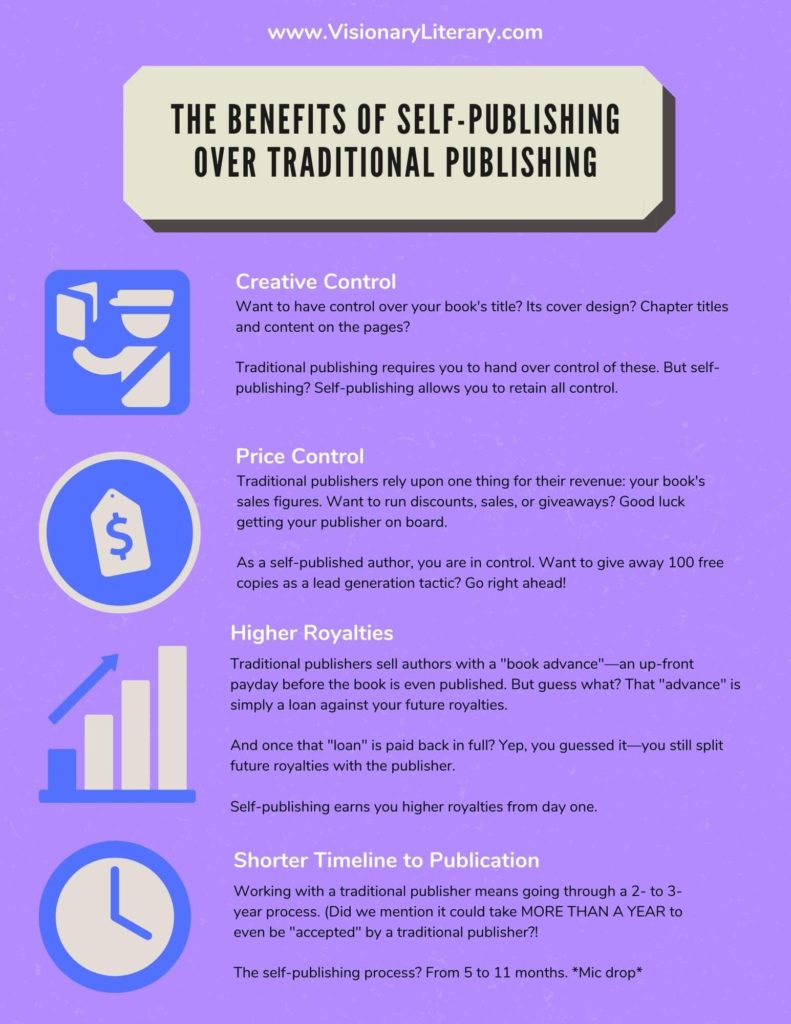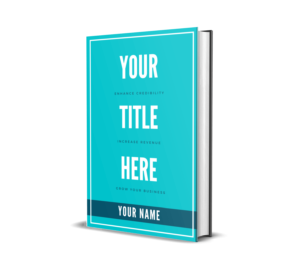Self-Publishing versus Traditional Publishing: Which Is Better for Your Business Goals?
You’ve decided that you want to write and publish a book, but what’s next? Determining how you are going to tackle the publishing process is one of the most important things to think about when it comes to your goals.
There are many questions you should be asking yourself during the book writing and publishing process, but likely one of the biggest has to do with the latter. Are you going to choose self-publish or go the traditional publishing route?
There are a variety of factors that could impact your decision, and sometimes the answer isn’t super clear one way or the other. Self-publishing tends to be the right choice for many authors, as it offers quite a few positives over publishing a book traditionally.
Self-publishing means that you’ll tackle the entire process, from printing to editing to proofreading and marketing – all independently as an author, or with a team of experts who can help you (like us).This means you’ll also own the rights and royalties.
Keep reading to learn more about the process and some of the benefits that come with choosing to self-publish your books!
Benefits of self-publishing
As we mentioned before, as a self-published author, you’re in charge of the production process. This gives you some unique advantages over the traditional publishing route, including:
Creative Control (and Freedom)
You own the process – you own creative control. When you go the traditional publishing route, you have to consider opinions from people in different departments. This can be anything from book cover design or what materials you should be using for marketing.
One great benefit of self-publishing your book is that you get to be involved in every aspect of production. Getting input and help from outside experts and designers is always a good idea, but you’ll be able to share your vision with them and they’ll help you work towards that.
If you want total autonomy and the ability to collaborate with who you want, then self-publishing is the way to go.
Higher royalty rates
One of the more obvious benefits of self-publishing has to be the higher royalty rates. When you go the traditional route, typically, you’ll get only between 5-20% of the book’s selling price after your advance is accounted for.
There are some factors that come into play with this rate, including the format of the book. Hardcovers are going to have higher royalty rates than paperbacks.
You have the potential to earn higher profits when self-publishing your book. Self-published authors typically get between 50-70% royalties. Traditionally published authors, however, turn over 100% of profits until their “book advance” (an advance payment given to an author that must be paid back) is paid in full. Then, royalty payments are split for the remainder of the book’s life.
As a self-published author, you retain 100% of royalty payments from the launch date until…well, forever.
Price freedom
Along with higher royalty rates comes the ability for you to have freedom when it comes to what you do with your book after it is published.
Again, a traditional publisher is going to be in control of everything. That means that if you want to give away copies or offer a discount, you won’t be able to with their sign off. Having the ability to control these things can help you earn more of a profit in the long run.
For example, if you’re a public speaker, you can offer to give a number of copies to the event organizer. These can be given to random audience members during your presentation. Or, you can discount a certain number of copies of your book and promote the sale on social media!
Try running that by your traditional publisher and see what kind of response you get.
We’ll tell you: it will include lots of laughs with an eventual “no” at the end. Why? Because traditional publishers only make money in one way: book sales. You, on the other hand, don’t rely solely on book sales.
These are just a few examples of creative ways you can get your book out there, which ultimately can help you improve credibility and increase your sales numbers as time goes on.
Shorter timeline
Nobody likes to wait, and when you’re trying to publish a book, you want to see the finished product sooner versus later!
Want to write a book in 2022?
One frustrating thing about traditional publishing is the amount of time it can take to get your work over the finish line. Collaboration across such a big scale can drag on, with emails and meetings between agents and professionals who are trying to get all the pieces working together
Even smaller traditional publishers still have to slot you into their publication and marketing schedules. The process can take about 2-3 years from the time you sign a contract to the time you publish the book.
This doesn’t even take into account the process of finding a literary agent. Most publishers won’t accept “unsolicited manuscripts,” which means finding an agent to help you in the process is necessary. Just this process alone can take years!
The process of self-publishing is significantly faster. The timeline is only dependent on how quickly you and the team you choose to help you in the process can get things done.
For example – with our main packages, the timeline typically ranges between 8-10 months. That shaves off a few years at least, which means your book is out on the market faster!
Keep your rights
Traditional publishers who get a hold of your manuscript are buying the rights to publish it. When you self-publish, you don’t have to worry about signing away any of these, which include:
- Primary publication rights (the first to publish a book in the market)
- Subsidiary rights (the ability to publish a book in other formats, like film or audiobooks)
Self-publishing means you can have the ability to take advantage of potential opportunities down the line. You could choose to sell subsidiary rights if you want to take advantage of offers that come up.
Make a name for yourself
As we’ve mentioned, traditionally publishing a book is hard, and becoming a bestselling author is even harder. If you’re a first-time writer, self-publishing is a way to attract a fanbase and build up credibility.
Self-publishing gives you the opportunity to build up an email list. Self-publishing can also provide you with ammunition in the future if you decide to write another book and approach a traditional publisher. A lot of successful authors get their start self-publishing.
When does it make sense to traditionally publish a book?
There are a few circumstances that make traditional publishing a more beneficial choice, but these circumstances are rare. For starters, it’s hard to get an offer to publish this way. You also have to find a literary agent to help pitch it to a publishing company.
Get this: less than 1 percent of these proposals are accepted!
If you do happen to get an offer and an advance of $500k or more from the publisher, taking the deal makes sense. In most cases, only certain types of people can make these deals. These include celebrities, famous athletes, politicians, or professional writers who have a long history of high sales.
(But remember, those advances have to be paid pack in full before you can collect a single penny from royalties.)
Who should self-publish?
If you don’t fall into one of those categories we just mentioned, it makes sense to self-publish. Without an offer and advance from a major publisher, the benefits of self-publishing outweigh any potential disadvantages.
So whether you’re a business owner, entrepreneur, public speaker, or just want to get your book out there, you should seriously consider self-publishing!
Get started on your self-publishing journey today!
Full creative control—that’s what many nonfiction authors want. If you’re one of the experts mentioned above, you are entrepreneurial-minded and know that a book can drive revenue to your business in many more ways than simple book sales. And you’re right.
After reading all of the benefits that come along with the process, it’s not a hard decision to make.
Our team of experts is here to help support you through the process and make your vision come to life. Services we offer include:
- Outlining
- Manuscript creation
- Copyediting
- Proofreading
- Layout
- Book cover design
- Marketing
- Paperback, hardcover, eBooks, and audiobooks
- And more!
You can book a free consultation today with one of our Publishing Consultants, who will help answer any questions you might have!


